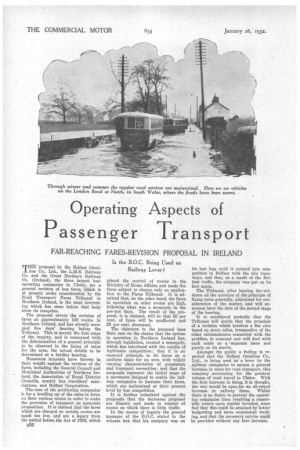Operating Aspects of
Page 50

If you've noticed an error in this article please click here to report it so we can fix it.
Passenger Transport
FAR-REACHING FARES-REVISION PROPOSAL IN IRELAND
Is the B.O.C. Being Used as
Railway Lever? THE 'proposal by the Belfast Omnibus Co., Ltd., the L.M.S. Railway Co. and the Great Northern Railway Co. (Ireland), the three largest busoperating companies in Ulster, for a general revision of bus fares, which is at present under consideration by the Road Transport Fares Tribunal in Northern Ireland, is the most interesting which has come before that body since its inception.
The proposal covers the revision of fares on approximately 120 routes in Northern Ireland, and has already occupied five days' hearing before the Tribunal. This is merely the first stage of the inquiry, and is concerned with the determination of a general principle to be observed in the fixing of rates for the area, the actual details to be determined at a further hearing.
Numerous interests have thrown in their weight against the revision of the fares, including the General Council and Municipal Authorities of Northern Ireland, the Association of Rural District Councils, sundry bus travellers' associations, and Belfast Corporation.
The case of the petitioning companies is for a levelling up of the rates in force on their various routes in order to make the provision of transport an economic proposition. It is claimed that the fares which are charged on certain routes are much too low, and are a legacy from the period before the Act of 1929, which B30 placed the control of routes in the Ministry of Home Affairs, and made the fares subject to change only on application to the Pares Tribunal. It is admitted that, on the other hand, the fares in operation on other routes are high, following what was a monopoly in the pre-Act days. The result of the proposal, it is claimed, will be that 50 per cent. of fares will be unaffected and 25 per cent. decreased.
The objectors to the proposal base. their case on the claims that the system in operation in Northern Ireland has, through legislation, created a monopoly, which has interfered with the results of legitimate competition; that it is an unsound principle to fix fares on a uniform basis for an area with widely varying characteristics of population and transport necessities; and that the proposals represent the initial stage of a movement designed to enable the railway companies to increase their fares, which are maintained at their present level by bus competition.
It is further submitted against the proposals that the decreases proposed are illusory and made in respect of routes on which there is little traffic.
In the course of inquiry the general manager of the B.O.C. stated in the witness box that his company was on its last legs until it entered into competition in Belfast with the city tramways, and that, as a result of the Belfast traffic, the company was put on its feet again.
The Tribunal, after hearing the*evideuce on the question of the principle of fixing rates generally, adjourned for consideration of the matter, and will announce later the date of the second stage of the hearing.
It is considered probable that the Tribunal will decide that the principle of a revision which involves a fiat rate based on route miles, irrespective of the other circumstances connected with the problem, is unsound and will deal with each route as a separate issue and purely on its merits.
Amongst the public a feeling is reported that the Belfast Omnibus Co., Ltd., is being used as a lever by the railway companies to secure a general increase in rates for road transport, this company accounting for the greatest volume of road travel in Ulster. With the first increase in being, it is thought, the way would be open,f or an all-round increase in railway fares. Whilst there is no desire to prevent the operating companies from receiving a reasonable return upon capital invested, some feel that this could be attained by better budgetting and more economical working, and that the necessary service could be provided without any fare increase.






























































































